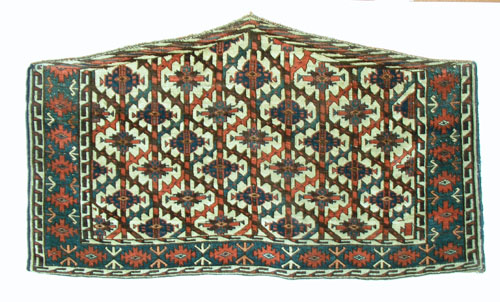Posted by Steve Price on 08-19-2004 06:03 AM:
Two Yomud "Ashik Gul" Asmalyks
Hi People
I have two Yomud asmalyks, nominally similar, one of which I
think is much better than the other (which is still pretty good, in my opinion).
Here's the first one:

It was published in a Swedish
generalist book, entitled Orientalisk Mattor as the illustration of Yomud
asmalyks. So, somebody besides me thought it was a worthwhile piece. It was
probably made around 1875, maybe a little earlier. The dyes all appear to be
natural, and the colors are well balanced and attractive. The drawing is good.
One characteristic that suggests that it isn't much older than the date to which
I attribute it is the near-perfectg centering of the field. That also makes it
somewhat less attractive, in my eyes.
The second piece is probably
familiar to many of you, since it's appeared on the web several times. Here it
is:

I think
it's much better and considerably older. The wool is marvelous, and feels like
fur. The main border is beautifully drawn, with excellent color. Note that the
uppermost three ashiks in the side borders are each surrounded by points of
white. I haven't seen this in any others, and find it interesting.
The
eccentricity of the field and of the borders adds interest to the piece, too, as
does the presence of two distinct forms of gul in the
lattice.
Regards
Steve Price
Posted by Patrick Weiler on 08-21-2004 06:21 PM:
Which is the chicken, which is the egg?
Steve,
One feature of the first piece is that the top section is
taller. The sides are more steeply angled than the second piece. The second
piece is flatter on top. Do you know if this is a feature of age? Or is it just
an idiosyncrasy of the weaver? Are more steeply angled pieces favored more
highly in general, or flatter pieces?
The first piece appears to have
white ashiks on a red ground, a "baklava" type design. The second piece appears
to have a serrated lattice on a white ground. Does this design represent
something? I am familiar with lattice-work windows, from which peering virgins
espied their future husbands, although these windows certainly did not exist in
yurts! Perhaps the asmalyk is the symbolic representation of carrying the
windows, from behind which the future bride was kept, to her new husband's
home.
Which did you acquire first?
Did you buy the first one and then
found the "better" second one? Or did you already have the second piece when you
acquired the first?
Patrick Weiler
Posted by Steve Price on 08-21-2004 10:23 PM:
Hi Patrick
As far as I know, the angle made at the top is not related
to age. If the motifs have meaning, those meanings are lost in the dustbin of
history and are unlikely to be discoverable.
I acquired the younger one
(the first one) long before I got the second. I like them both, although the
second one is, in my opinion, far better in many respects. But neither really
qualifies as a "beginner msitake", in my view.
Regards
Steve
Price
Posted by Filiberto Boncompagni on 08-22-2004 04:03 AM:
Hi Steve,
You say of the second asmalyk that "The wool is marvelous,
and feels like fur."
Unfortunately the tactile quality of the wool is
not transmittable through the web, but even without experiencing it I prefer the
second one: I like its lightness, not only in terms of color but also of
elegance.
Regards,
Filiberto

